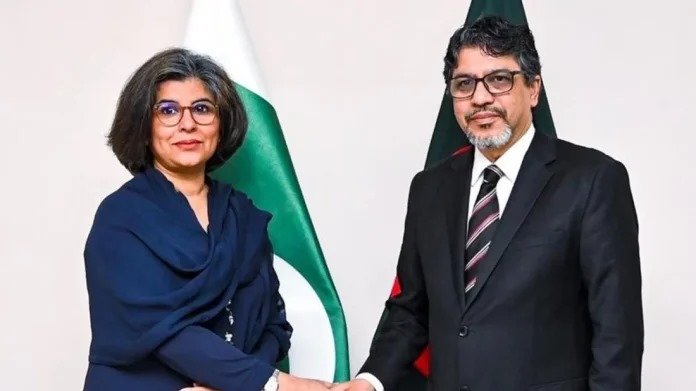A key breakthrough came with mutual praise for the launch of direct shipping between Karachi and Chittagong, marking a significant stride in boosting regional trade

By Mustak Zahid
DHAKA: The foreign secretaries of Pakistan and Bangladesh held their first high-level bilateral talks in 15 years, signaling a thaw in relations and a shared ambition to revitalize ties through greater political, economic, cultural, and strategic collaboration. The rare engagement, hosted in Dhaka, marks a notable shift in South Asia’s evolving geopolitical landscape.
The meeting, led by Pakistan’s Foreign Secretary Amna Baloch and her Bangladeshi counterpart Md Jashim Uddin, underscored both nations’ interest in moving beyond the shadows of history to build practical frameworks for cooperation. A statement issued by Pakistan’s Ministry of Foreign Affairs noted that the two sides agreed to institutionalize regular dialogue, accelerate the finalization of long-pending agreements, and enhance cooperation in areas including trade, education, agriculture, and regional connectivity.
Among the most tangible outcomes was the joint appreciation of the launch of direct shipping services between Karachi and Chittagong—an important step toward increasing regional trade. Discussions also included plans to resume direct air connectivity and improve visa facilitation, crucial for expanding people-to-people ties.
A significant part of the dialogue involved regional cooperation. Both foreign secretaries reaffirmed their countries’ commitment to reviving the South Asian Association for Regional Cooperation (SAARC), with Amna Baloch emphasizing that SAARC must be shielded from bilateral political disputes that have long paralyzed its functionality.
Addressing pressing international concerns, the two delegations jointly condemned the escalating humanitarian crisis in Gaza and the continuing violations of human rights in the occupied Palestinian territories. The meeting provided a platform for both governments to express solidarity with the Palestinian people and call for urgent international action.
On the Kashmir issue, Baloch reiterated Pakistan’s position by briefing the Bangladeshi side on the situation in Indian-administered Jammu and Kashmir. She emphasized the need for a peaceful resolution aligned with UN Security Council resolutions and the aspirations of the Kashmiri people.
During her stay, Baloch also held important side meetings with Chief Adviser Prof. Muhammad Yunus and Foreign Adviser Md Touhid Hossain. These meetings focused on regional economic integration and stressed the importance of ensuring bilateral relations remain uninfluenced by external pressures.



